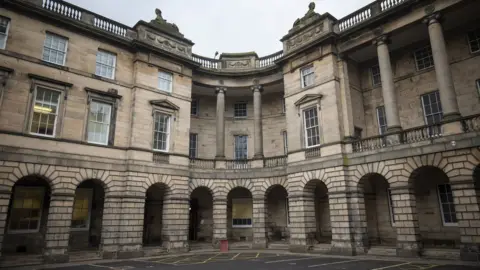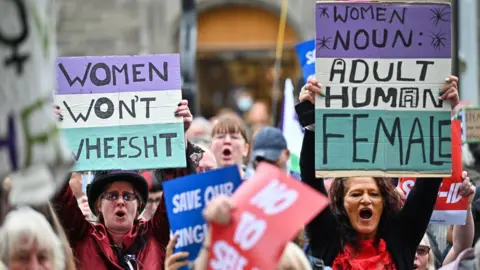Scottish government back in court over definition of 'woman'
 PA Media
PA MediaA campaign group has taken the Scottish government back to court over its definition of "woman" in legislation promoting gender balance on boards.
A judge ruled in February that ministers should not have "conflated" women and trans people in the bill, as they have separate protections in law.
But the For Women Scotland group is not happy with how the government revised the bill following the ruling.
Lady Haldane will preside over two days of arguments at the Court of Session.
The Scottish government wants the case dismissed, arguing that its legislation is now in line with the terms of the 2004 Gender Recognition Act.
The case centres on the Gender Representation on Public Boards Act, which was passed by MSPs in 2018.
The legislation, which aims to ensure gender balance on public boards, originally stated that it included people who were living as a woman and who either had gone through or intended to go through the gender recognition process.
For Women Scotland contended that ministers had broken with the separate definitions of women and trans women laid out in the 2010 Equality Act - and had thus acted beyond their powers.
Protected characteristics
The group lost an initial judicial review in 2021, but were successful on appeal.
Lady Dorrian ruled that by incorporating trans people who were living as women into the definition of woman, the bill "conflates and confuses two separate and distinct protected characteristics".
Because the bill singled out trans people living as women, the judge said it sought to apply to "only some of those with the protected characteristic of gender reassignment".
Her judgement also stressed that the case was about "interpreting the law in relation to the legislative competence of the Scottish parliament", and not transgender rights - "a separate policy issue entirely".
 Getty Images
Getty ImagesThe Scottish government responded by revising the guidance that accompanies the legislation, to stress that it covers women as defined by the Equality Act - but also trans people as defined by the 2004 Gender Recognition Act (GRA).
The guidance quotes directly from the 2004 Act, and reads: "Where a full gender recognition certificate has been issued to a person that their acquired gender is female, the person's sex is that of a woman. And where a full gender recognition certificate has been issued to a person that their acquired gender is male, the person's sex becomes that of a man."
The government's written argument for the case says the GRA is "unambiguous" that a certificate provides for a change of sex, and that "there is nothing in the 2010 Act which takes away from the fundamental proposition" of the 2004 Act.
For Women Scotland argue that the guidance still does not comply with the court's ruling, and that by making reference to sex the government was "still confusing the protected characteristics and are trying to redefine 'woman' yet again".
The group's lawyer Aidan O'Neill KC argued that obtaining a gender recognition certificate should not "result in a change of sex for the purposes of the Equality Act".
He said if it did, it would "run a coach and horses through the preservation of safe spaces for women and single-sex provision for women under the Equality Act".
The proceedings are taking place at the same time as MSPs are considering separate legislation which would make it easier for trans people to obtain a gender recognition certificate.
Social Justice Secretary Shona Robison told MSPs there would be "no change to the protections under the Equality Act", adding: "Helping one group to better access their rights does not mean diluting or diminishing the rights of another group."
Asked about the judicial review, the minister said she was "not going to comment on a live court case".
